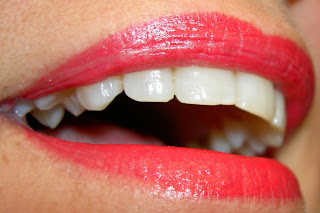Sensors in dental implants could provide to your doctor and dentist some very important data about your oral health.
Some people might find this creepy, Orwellian, or the implementation of too much surveillance. With all the news about the NSA monitoring citizens, I can understand some concerns about this technology.
"They're tracking my phone calls. Are they now moving from my iPhone right into my mouth?" you may ask skeptically.
Let's look at an article at Gizmag entitled:
These high tech tooth sensors may give a whole new meaning to "Bluetooth."
QUOTE
National Taiwan University researchers reasoned that if they could hook up the mouth with some sensors, it could help to better understand people’s habits and identify potential health problems, such as if a person is smoking or drinking too much.
Designed to fit into an artificial tooth, it includes a tri-axial accelerometer that monitors mouth movements to figure out when the patient is chewing, drinking, speaking, or coughing, with the readings transmitted to a smartphone via Bluetooth.
Currently, the scientists are still at the proof of concept stage, so their first design dispensed with the James Bond-style artificial tooth embedded with a radio transmitter in favor of a small breakout board that’s been coated with dental resin.
This makes it saliva-proof and able to be anchored to the subject’s dental work with dental cement while the transmitter’s job is done by a wire running out of the mouth.
This may seem a bit low tech, but it does prevent the subject from swallowing the device if it comes loose.
http://www.gizmag.com/sensor-teeth/28511/
END QUOTE
http://www.gizmag.com/sensor-teeth/28511/
END QUOTE
My professional viewpoint as a dentist on this issue is positive.
It could help people track the carbohydrates, especially sugar, intake in their diet. Also, it could track the pH, ie. acidity of the beverages consumed by a person.
This could help diagnose if the person may need to alter his/her diet or use a specific toothpaste to help re-mineralize the enamel.
Perhaps, sensors could track the stress placed upon teeth and may indicate the need for night guard appliances for people who grind or clench, especially at night.
I believe this development is currently in its embryonic stage and will progress to the utilization of sensors that accumulate significant data.
I believe this development is currently in its embryonic stage and will progress to the utilization of sensors that accumulate significant data.
This will help diagnose existing and potential problems in the mouth and should help to make recommendations in treatment based upon the data collected. This should be a win-win for dental patients and dentists.


No comments:
Post a Comment
Your input, feedback, questions, and remarks are welcome. To prevent spam, comments are moderated, but not censored. You should see your comment published within 24 hours.